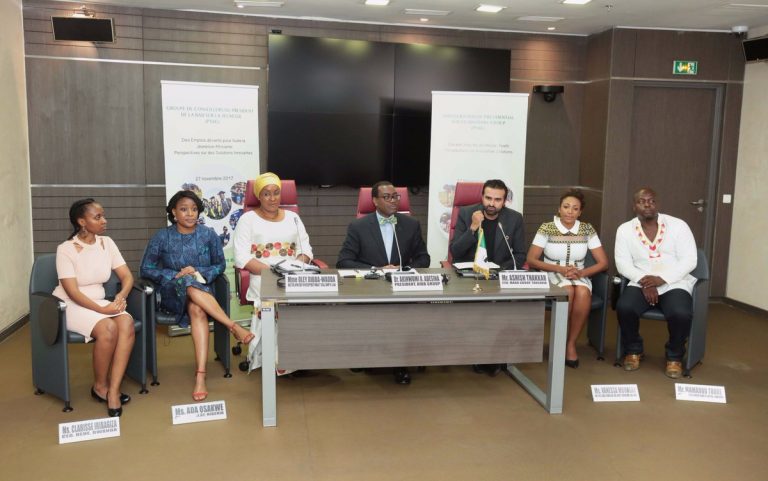Dr. Akinwumi Adesina, President of the African Development Bank (AfDB) Group on Monday, November 27, 2017, lamented a situation where only 33% of the 13m young Africans enter the labour market each year and become gainfully employed, while the large majority remain underemployed or undertake precarious work.
Speaking at the launch of the Presidential Youth Advisory Group (PYAG) on the sidelines of the 6th European Union-Africa Business Forum in Abidjan, Adesina therefore called for urgent action to tackle the job deficit of over 8m per year, which is projected to get worse, as the number of young people in Africa double to more than 800m in the coming decades.
To support the continent, AfDB plans to invest $1.5bn per year over the next 10 years to support young “agripreneurs,” up from $800m last year to support young agricultural entrepreneurs in eight countries, and is expected to grow to 15 countries by the end of this year.
A statement by the AfDB on Tuesday, quoted the President as saying the challenge in itself, indeed, offers a huge opportunity for the continent, because “if we solve the problem of youth unemployment, Africa will gain 10 to 20 percent annual growth. This means that Africa’s GDP will grow by $ 500 billion a year over the next thirty years. Per capita income will increase by 55% per year until 2050.”
Continuing, he said: “Africa is experiencing a youth unemployment crisis,” and that the alternative is that the rapid growth of the youth population could pose serious social, economic, political and security problems.
Young Africans are dynamic and courageous, he continued, which is the only explanation for the high rate at which they cross the desert or the Mediterranean Sea, in search of decent jobs despite the risk at a time unemployed graduates populate the streets across Africa.
The lack of employment opportunities, he stressed, also feeds violence and extremism, with an estimated 40% of young Africans taking up arms, joining gangs or terrorist groups “because of the limited opportunities available to them in their countries.”
The AfDB President added: “66 million young Africans earn less than $ 2 a day, less than the price of a hamburger… 66 million is eight times the population of Switzerland, six times that of Belgium, the same as that of the United Kingdom, France or Italy, or 80% of the German population. ”
The PYAG, with nine members all under the age of 40, who have made significant contributions to creating employment opportunities for African youth, will work closely with the AfDB to provide innovative ideas and solutions to create jobs for African youth, in line with the AfDB’s “jobs for young people in Africa” initiative.
The initiative aims to create 25 million jobs and benefit 50m young people over the next 10 years, giving them the needed skills to get decent and sustainable jobs.
The motivations leading to establishment of the Presidential Advisory Group on Youth, Adesina explained, follows awareness of the “energy, creativity, innovation and excellence phenomenal entrepreneurship offered by many of our young people. It is for this reason that the AfDB wants to be advised by young people on its policies, actions and programs for the youth of Africa.
“Members of the Presidential Youth Advisory Group should actively engage private sector partners, heads of government, civil society, donor partners and other stakeholders,” said President Adesina. They will support the colossal work the African Development Bank is already doing and promoting across the continent with its ‘Jobs for Young People in Africa’ strategy.
PYAG is chaired by Ashish Thakkar, a Ugandan national and founding CEO of the Mara Group; while members are: Uzodinma Iweala, award-winning Nigerian author; Mamadou Touré, a Cameroonian and CEO/founder of Africa 2.0/Ubuntu Capital; Vanessa Moungar, Director of Gender, Women and Civil Society, who hails from Chad; Francine Muyumba, the Democratic Republic of Congo and President of the Pan African Youth Union; Jeremy Johnson, an American who co-founded Andela, a start-up; Clarisse Iribagiza, Rwandan and CEO of Heh; Ada Osakwe, also a the Nigerian, who is CEO of Agrolay Ventures; and Zambian Monica Musonda, CEO of Java Foods.
Commenting, Thakkar expressed appreciated the great honour to serve the continent in this role, especially given “that the stakes are enormous, but we are determined to fulfill this mission of creating thriving young businesses that generate high added value. We will also focus on helping to realize the African Development Bank’s High 5 and Sustainable Development Goals. We have just completed our work programme for next year and we are already on the warpath.”
He recalled how his family lost everything during the Rwandan genocide in the 1990s: “I borrowed $5,000 to start my business without support of any kind. Today, the Mara Group has 14,000 employees worldwide. I was alone, so imagine what we could do with the support of an institution like the African Development Bank!” He enthused.
For Touré: “I have never heard of such an important institution as the African Development Bank, which has created an all-young advisory group. A Chinese proverb says, “If you want a year of prosperity, plant a seed; if you want 10 years of prosperity, plant a tree; if you want a century of prosperity, invest in human development “.
Osakwe explained that “40% of entrepreneurs in Nigeria are women, but 73% of them operate in retail systems. We need to address this and provide young people with better paying jobs. ”
Trending Today
Menu








